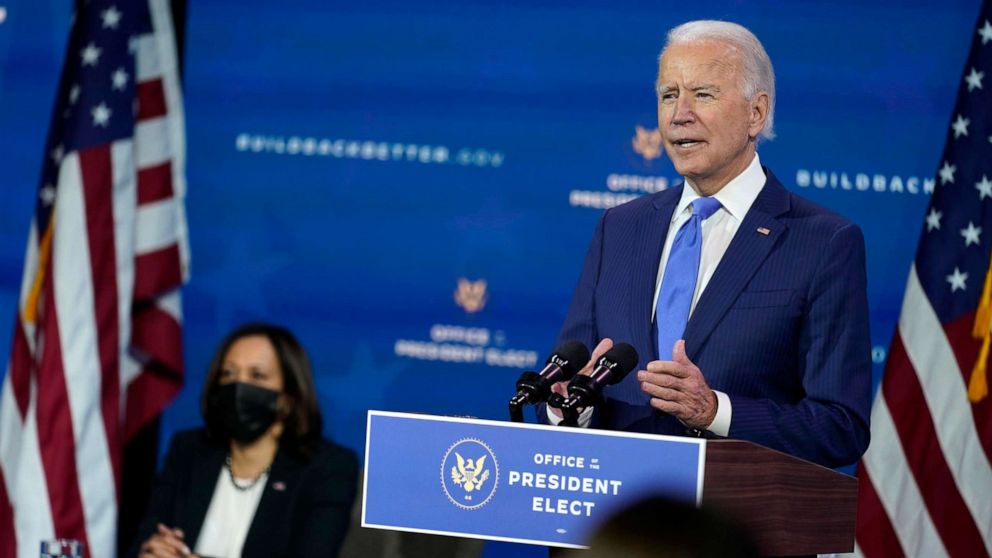Civil rights leaders pressed Biden, Harris on diverse Cabinet picks and criminal justice
President-elect Joe Biden and Vice President-elect Kamala Harris met virtually Tuesday with civil rights leaders amid calls to further diversify the highest level of their government set to take office in under two months.
The meeting, described in a press release from the leaders as a discussion on "racial equity, social justice, and increased diversity in the Biden-Harris Cabinet," included the heads of seven of the nation's most prominent civil rights organizations, including the NAACP, the National Urban League and the National Action Network, led by Rev. Al Sharpton. The call was scheduled for one hour but lasted for nearly two.
The group discussed a wide range of topics, from stressing a diverse Cabinet to issues the advocates felt should be at the forefront in the Biden administration. Those included civil and voting rights as well as health disparities.
The call comes as Biden and Harris have faced continued pressure from a variety of interest groups to tap diverse picks to follow through on Biden's long-held promise to appoint a Cabinet that "looks like America" -- a promise Biden has said he will deliver on throughout the remainder of the month.
"Their job is to push me," Biden said in an interview with CNN prior to the meeting. "My job is to keep my commitment and make the decisions."
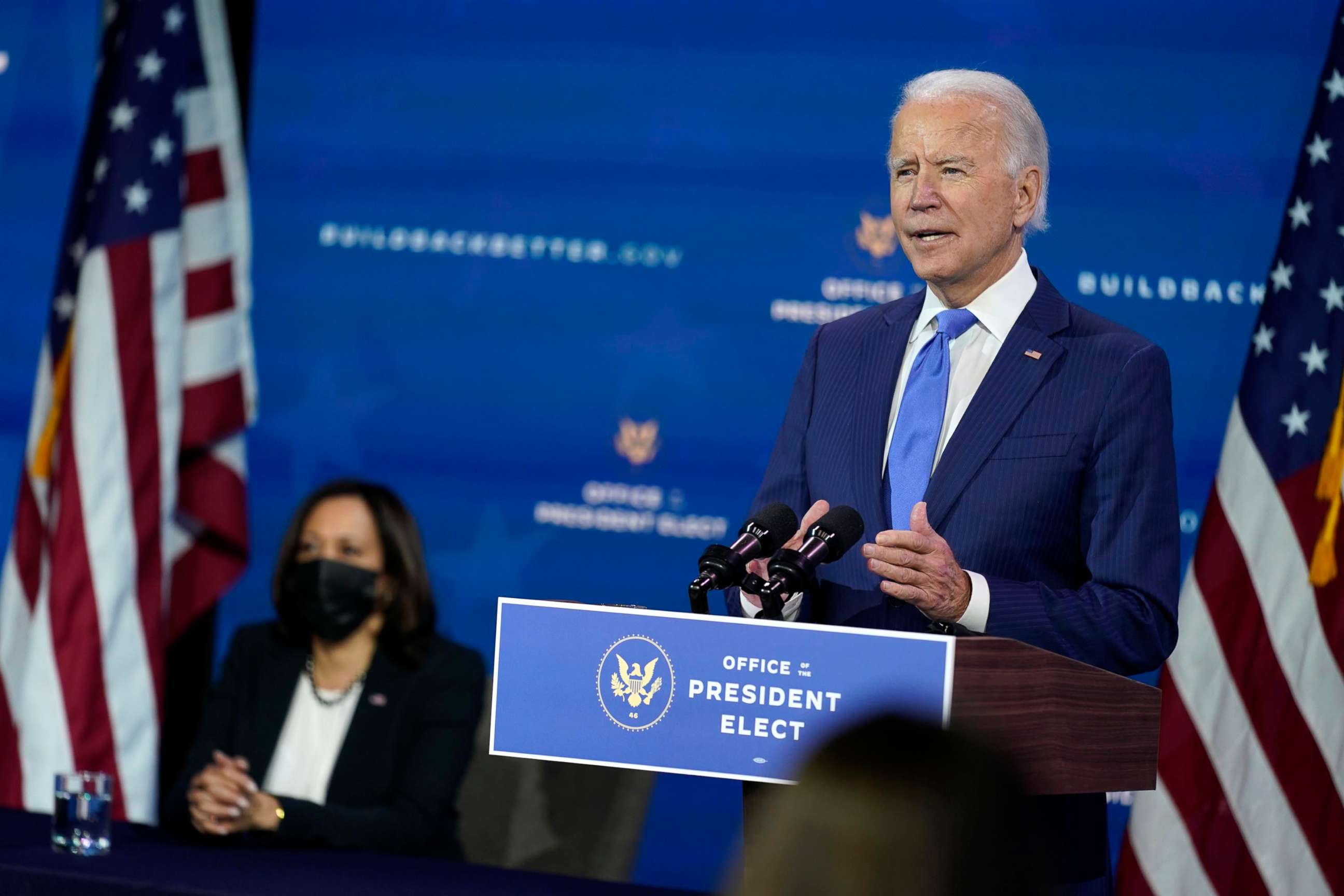
Leaders of the civil rights' groups spoke positively of the meeting but said their satisfaction ultimately will be determined by the president's choices.
"We talked about the type of person we want to name and we talked about the need to have someone who could walk in the door, day one who understands how the Justice Department works, who can help build morale of the career employees and immediately get started with the focus on some key primary areas like addressing domestic terrorism, addressing the public corruption that we've seen that's been so rapid," NAACP President and CEO Derrick Johnson said of the meeting on ABC's Powerhouse Politics podcast on Wednesday.
Johnson told ABC News Chief White House Correspondent Jonathan Karl and Political Director Rick Klein that the relationship between the Civil Rights groups are very different from the relationship these groups had with President Donald Trump.
"We are in a different posture with this administration. It's not adversarial. It is open for dialog," Johnson said. "And and many of us who walk into the room have prior communications or relationship with the president-elect."
Some members knew Vice President-elect Harris prior to her time in the Senate. Johnson said that the meeting "was a positive opportunity for us to begin to talk about how we can create the space for positive input, which was an outcome of a successful administration to address many of the issues that the civil rights organizations are concerned about."
“I think this meeting is the most important meeting that the president-elect and the vice president-elect have held since taking office," National Urban League President Marc Morial told reporters after the meeting. "This president-elect, as a candidate, made a historic commitment to racial justice. He reaffirmed the commitment to racial justice as one of the four pillars that will guide his incoming administration. And of course, the issues of racial justice and the related issues, whether it's policing, criminal justice, the racial wealth gap or educational equity, are central to the work of each and every one of our organizations."
Morial added, "The president-elect reaffirmed that he intends to make history when it comes to the appointments of African Americans and Hispanics to his Cabinet, the sub Cabinet and the White House. And while we will not judge the ultimate outcome, and we cannot at this time, for me, it was refreshing to hear him reaffirm that commitment in the meeting to us, but we will judge the Cabinet and the sub-Cabinet and the White House staff, ultimately, by the results."
Despite the ongoing pressure campaign by some outside groups, Biden has maintained that when his full Cabinet is announced, it will be the most diverse in American history.
"I'm not going to tell you now exactly what I'm gonna do in any department. But I promise you, it'll be the single most diverse Cabinet based on race, color, based on gender, that's ever existed in the United States of America," Biden told reporters last week during a press conference in Wilmington, Delaware.
The president-elect's team has also stressed that the Cabinet selection process is still in its early stages, and have highlighted the fact that several of Biden's picks thus far have broken barriers, including the first women to lead the Treasury Department and the nation's intelligence community, and the first African American individuals to serve as chair of the Council of Economic Advisers and deputy treasury secretary.
Biden's picks to lead both the Department of Homeland Security and Department of Health and Human Services will also mark the first time a Latino leads either of those agencies.
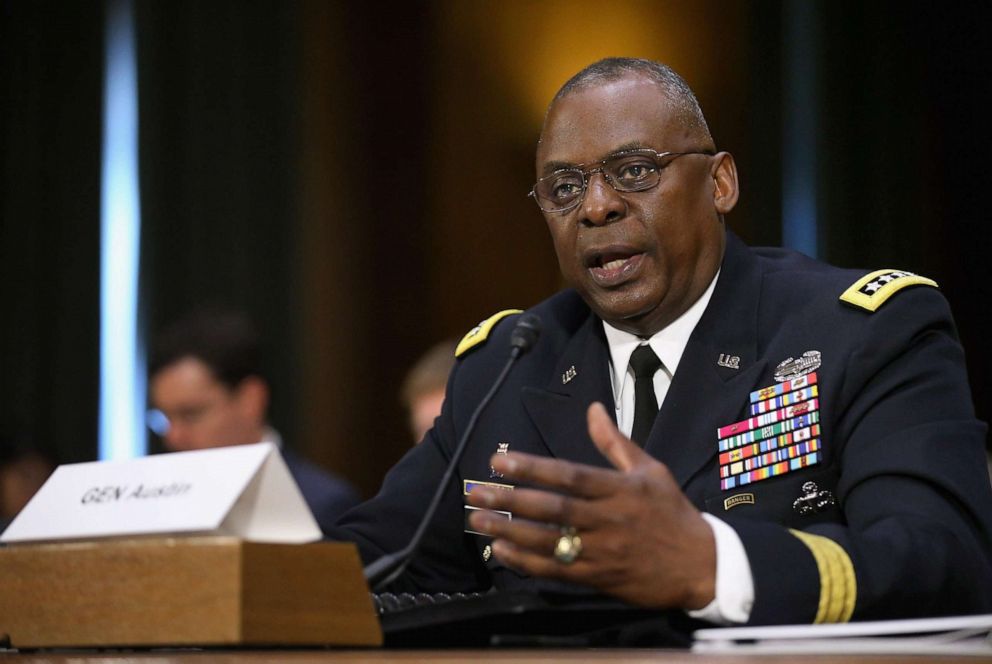
But outside of retired Army Gen. Lloyd Austin, Biden's pick to be the first African American to lead the Defense Department, the upper echelon of Biden's Cabinet, including his secretary of state, treasury secretary and chief of staff, remains mostly white.
Sharpton also commented on Biden's nomination of Austin to serve as secretary of defense, decrying what he called a "double standard" over concerns that Austin needs a waiver to serve in that position. Austin would need a waiver since he's served in the military within the past seven years. The waiver was granted to James Mattis in the Trump administration, but some Democrats have balked at making the waiver a regular occurrence.
"Don't put a standard on him that was not put on others. It is interesting to me, I said to the president-elect, that we hear about him needing a waiver. Well, we had two waivers in American history to make a Department of Defense secretary who had been in the military. We will not accept getting to the Black guy and, all of a sudden, we're going to change what we've already done twice," Sharpton said.
Another key unfilled position is attorney general, a post that will take on an outsized significance in the wake of a summer that saw nationwide protests over racial injustice and the state of policing in America.
Biden has demurred when asked if he would appoint a person of color to the role and has not yet announced when he expects to fill the position.
Sharpton stressed that his preference is to have an African American attorney general noting that he felt that they would need to have a civil rights background.
"My preference, I said to him, is to have a Black attorney general. Just as I said to him months ago, publicly and privately, my preference was to have a Black woman as vice president," Sharpton said after Tuesday's meeting. "I said, 'However, the least we could have is someone that has a proven civil rights background, not someone that's going to handle this heightened racist, bigoted atmosphere with on the job training.'"
Johnson told ABC that his choice for attorney general isn't a person, it's a profile. "The profile needs to be someone who understands how the department operates, who can increase the confidence and also get the support of the existing staff and have the courage to take all the hard issues that's going to be necessary, particularly around public corruption. The NAACP leader said, "you have to have someone who's willing to step right into the office in the midst of a fire and be willing to take on the fight, because this is not for the faint of heart."
Kristen Clarke, president and executive director of the Lawyers' Committee for Civil Rights Under the Law, told reporters, "Restoring the integrity of the Justice Department will be no easy task. And watered-down nominees will not be acceptable to our community. Whoever is selected for this most critical job must have a clear and bold record when it comes to civil rights and racial justice. And the idea that Senate confirmability should serve as a measuring stick to the person who occupies this most central -- most central role is deeply troubling and unacceptable."
Collectively, the group said Biden should pick an attorney general who will make it a top priority to reshape how the department handles both criminal justice and policing issues as well as voting rights enforcement through DOJ's Civil Rights Division.
When asked about potential names floated for attorney general, the group said Biden did not call out any specific individuals that have been rumored for the position but did note at one point that there should be no "watered down" nominees and that the ease of getting someone through the Senate confirmation process should not be factored into Biden's decision.
African American leaders have made the public case for other roles in a Biden-Harris administration, including former Massachusetts Gov. Deval Patrick, Congressional Black Caucus Chair Karen Bass and Tony West, Vice President-elect Kamala Harris' brother-in-law. West previously served as associate attorney general of the United States.
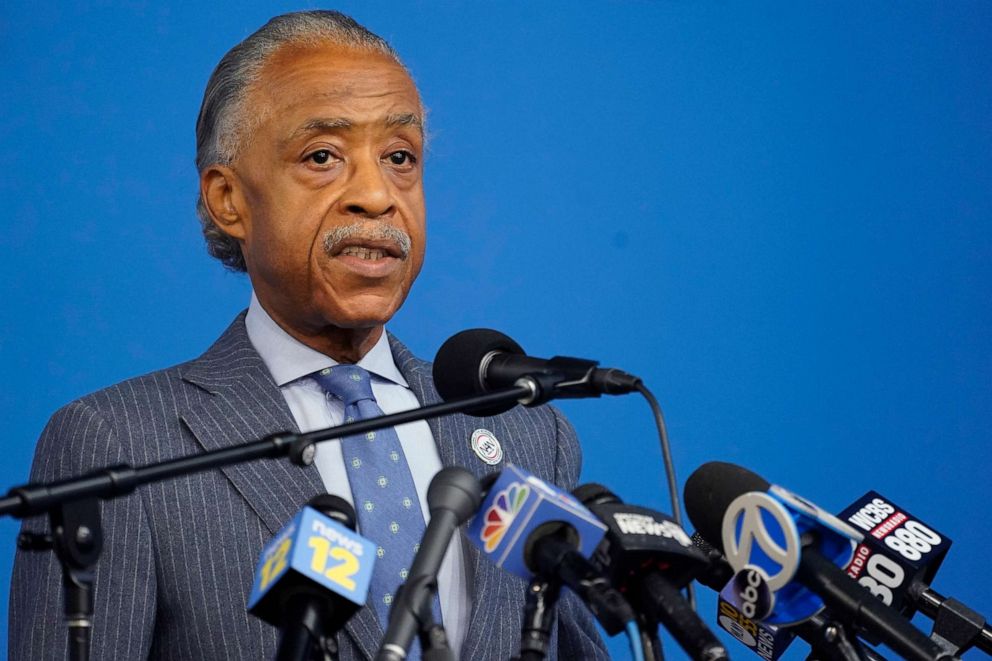
The group said that they did not discuss who would replace Harris in the Senate or if they prefer that an African American woman hold that position.
"When we hear names out there like a Tony West or like a Deval Patrick, that they should not be held to a different standard than anyone else in American history. Blacks are qualified to hold office and to be appointed. Whoever he chooses to appoint, we will not accept double standards. We did not ask him specifically about the names we heard. We mentioned some of the names I've said, and my colleagues can mention what they said. He made no commitment, including the fact that we were seeing names across the ticker while we were meeting," Sharpton added.
Sources familiar with Biden's decision have told ABC News that Biden will nominate Rep. Marcia Fudge, D-Ohio, to lead the Department of Housing and Urban Development.
Fudge, who is a past national president of Delta Sigma Theta Sorority, has served as a long-time member of the House Agriculture Committee, she currently chairs the subcommittee on Nutrition, Oversight and Department Operations and campaigned openly to become the first Black secretary of agriculture. She will however make history if confirmed as the second African American woman at HUD.
"As this country becomes more and more diverse, we're going to have to stop looking at only certain agencies as those that people like me fit in. You know, it's always, 'We want to put the Black person in Labor or HUD,'" Fudge told Politico last month.
Fudge received support from Rep. Jim Clyburn D-S.C., who's endorsement of Biden helped propel him to a resounding win in South Carolina following weak showings in early primary contests.
In an interview with MSNBC Tuesday, the South Carolina kingmaker said, "Look for her to be in the Cabinet. It may not be at Agriculture but she will be nominated to be in the Cabinet."
During the press call, several leaders heaped praise on Fudge, including Morial who said "HUD, like Justice, needs to be risen from a deep sleep. HUD, as an agency. And I welcome and congratulate the appointment of a dynamic, experienced member of Congress who knows how to lead, who has courage and passion for the work of HUD, and who has the gravitas to be a policymaker at the highest levels of the administration."
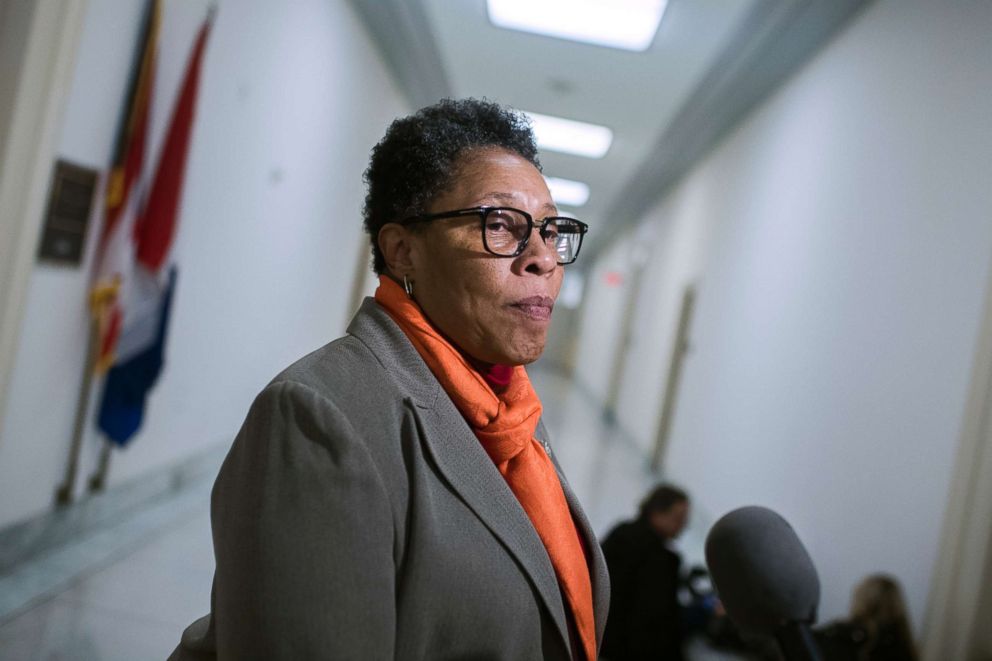
House Democratic Caucus Chair Rep. Hakeem Jeffries also weighed in about Fudge at a press conference on Capitol Hill on Tuesday morning backing Fudge's bid for agriculture secretary saying she "would be a tremendous secretary of agriculture," but said at the end of the day, Biden would make the ultimate call on who serves in his Cabinet.
In recent weeks, Fudge also received support from several progressives groups as well including People's Action's George Goehl who said in a statement earlier this month, "with Rep. Marcia Fudge at the helm, the Department of Agriculture would have teeth again to keep a check on corporate agribusiness." He noted "Fudge has spent her career defending SNAP, a critical anti-poverty program in rural communities, against Republican attacks and could reverse Trump's baseless work requirements."
Biden is expected to nominate former Iowa Gov. Tom Vilsack to reprise the role of secretary of agriculture, sources familiar with the transition told ABC News Tuesday evening.
The meeting with civil rights leaders took place after Biden and Harris unveiled top members of their health team Tuesday, which will be tasked with leading the federal government's response to the ongoing coronavirus pandemic.
Prior to the meeting, the NAACP's Johnson called on the Biden administration to create a new position -- a national adviser on racial justice, equity and advancement. This person "would be charged with centralizing bold, visionary thinking and strategy on racial justice within the White House and fostering the development of holistic measures throughout government to tackle the pervasive problem of systemic racism as never before. The Advisor would report directly to President Biden with an office fully resourced and staffed to accomplish its mission."
The NAACP said that the position is modeled after the climate envoy for national security.
Johnson told ABC on Wednesday that Biden has the "unfortunate responsibility of restoring trust in government to restore our ability to see each other as Americans first and the responsibility to enforce and rebuild our civil rights divisions within each of the agencies. And so his task is huge." He added, "I think the real calculus here is how do we repair all the harm that the current administration has done to the system of our governance, to the credibility of our government and our ability to see ourselves as one nation as opposed to divided tribes."
ABC News' Mariam Khan and Alexander Mallin contributed to this report.
